


![]()
Many people find exciting and valuable jobs in the natural resource field. Protection of our natural resources is an important job, so maybe you would like to be a Conservation Officer.Or, maybe you’d like to be a waterfowl biologist and help manage waterfowl. Perhaps being a forester and managing trees for harvest is something you might enjoy. Or, maybe you’d like to be a fisheries biologist and help keep lakes and streams healthy for people to fish in.
Here we will bring you some of different people who help make up the team that manages our resources. So please check back often.
"Interview with Al Hancock Waterfowl Research Technician"
Name: Al Hancock
Location: Iowa Dept. of
Natural Resources
1203 N. Shore Drive
Clear Lake, IA 50428
phone: (641) 357-3517
Job Title: Waterfowl Research Technician

A note about my picture:
I originally wanted to submit a picture of me rounding up geese from a canoe at sunrise or banding wood ducks with a gorgeous Ventura Marsh sunset in the background. Those are really enjoyable times that add romance to the job. However, it isn't a very realistic picture of how I spend most of my time. Someone has to get all the data from the bandings and surveys entered into the computer, summarized, and submitted for analysis, and that someone is me.
1. Favorite things to do outdoors as a kid?
I loved spending time in the "field" across the road from home. I chased all sorts of "critters" and, if I could catch it, I wanted to bring it home and keep it. Every corner of the garage was filled with glass jars with screwdriver holes in the lid for air. In the summer all of my daily "chores" had to de done before supper so I could make the evening journey to the lake to go fishing with my dad.
2. What were your favorite classes in school?
All of the science and math courses topped my list. I have a particular fondness towards physics. Unfortunately, I didn't spend more time on English, reading and writing classes. Being able to communicate becomes more important as you continue on in school. As a researcher, what good is the information that I gain from my studies if I can't communicate well enough to share it with others?
3. What kind of schooling do you need in order to work at the Iowa Department of Natural Resources at your job?
To be competitive for a job the applicant must have a minimum of a 4 year college degree in biology with an emphasis in wildlife management. Recently, successful applicants have had a masters degree.
4. How does your job help waterfowl?
The majority of my job deals with waterfowl banding and surveys. This is the basic information needed for managing the waterfowl resource in Iowa. I also get to work on research projects that are designed to answer questions on improving breeding habitat conditions.
5. What do you enjoy most about your job?
The variety in my job presents constant challenges on how to accomplish a task or how to do it better.
I also really enjoy the opportunity to work with kids. I give presentations at several youth field days as well as schools and the scouts. Every fall I conduct a local hunters education class.
6. What advice do you have for children interested in your profession when they grow up?
First, GET SERIOUS ABOUT SCHOOL! Once you get into a habit of putting your education first it will become much easier.
Second, become involved and participate. Attend the field days put on by your local conservation organizations. Nature centers are also an excellent place to learn more. Take your parents on a field trip to a marsh or a wildlife management area. The more you learn the better off you will be.
Interview With Wildlife Bureau Chief Richard Bishop
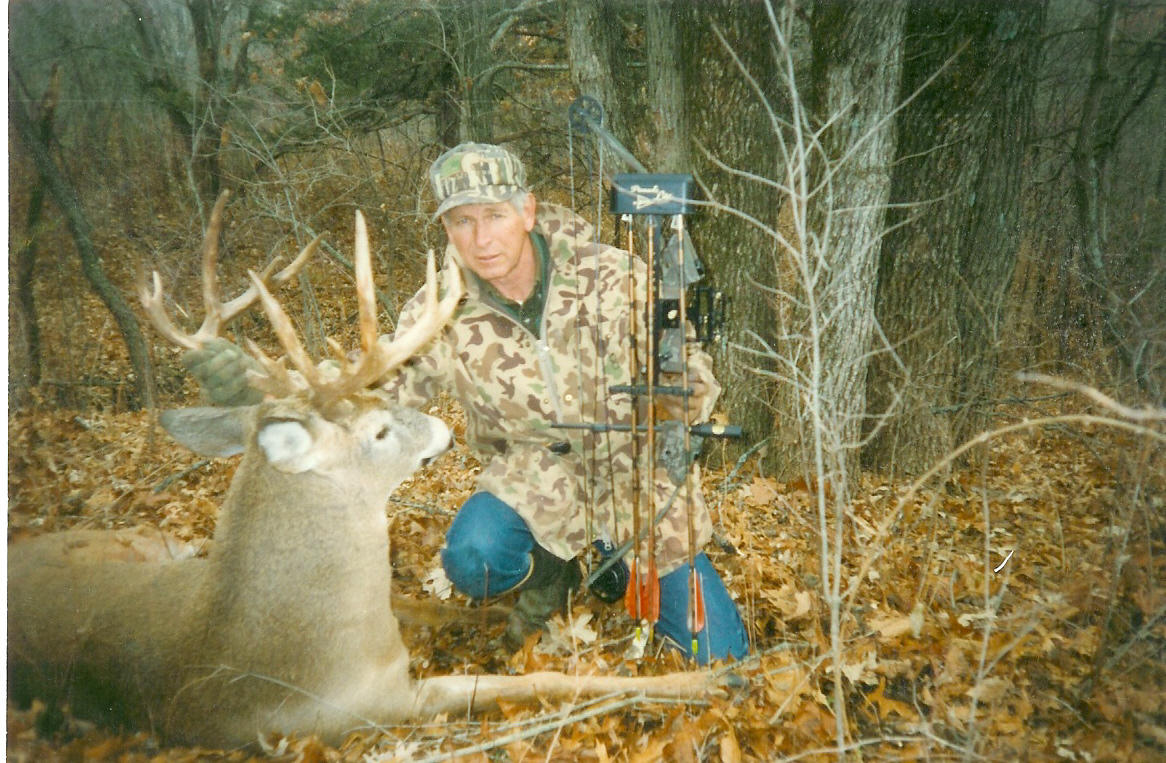
Name: Richard Bishop
Job Title: Wildlife Bureau Chief of the Iowa Dept of Natural Resources
Contact: [email protected] (515) 281-6156
1. Favorite things to do outdoors as a kid?
As a kid, I spent many hours along
small creeks catching minnows and crayfish or what ever else moved.
I loved
watching birds of all sorts and knowing their calls, where they nested and what
their nest and eggs looked like. I also had a butterfly and insect
collection.
Kids will find bugs very interesting and to know how they live and what they
eat.
As I grew older I loved to trap muskrats and raccoons and later I learned to
hunt
squirrels and rabbits. Just watching animals and birds is extremely
interesting.
2. What were your favorite classes in school?
My favorite subjects were biology, science,
math and English.
3. What kind of schooling do you need in
order to work at the Iowa
Department of Natural Resources at your job?
To obtain an interview for a wildlife biologist position you need a high
school
degree plus a 4 year degree in wildlife management or an animal ecology related
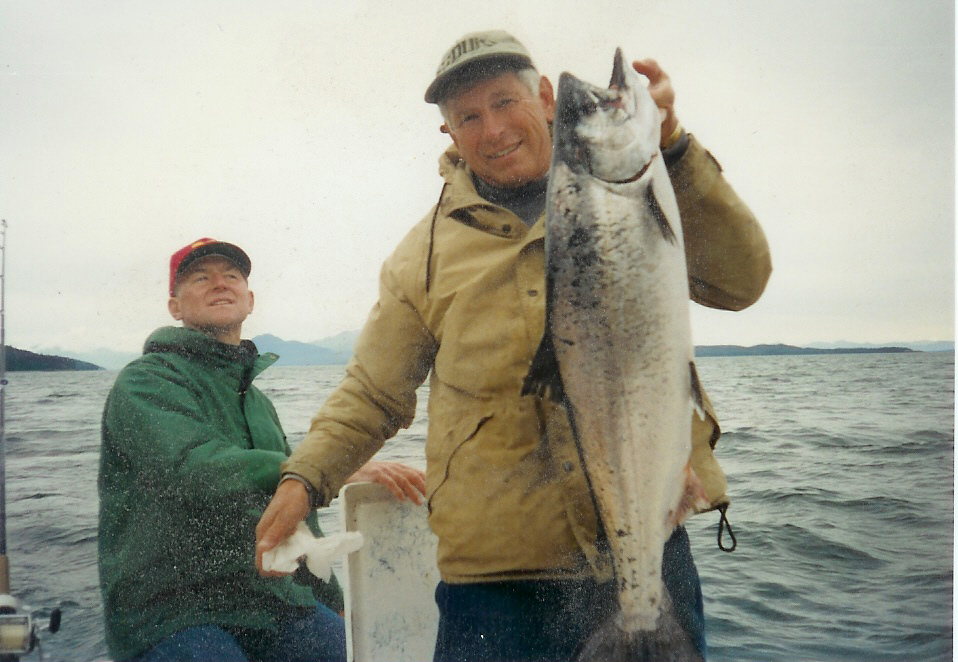
program. The best credentials are from a major state college that has a
wildlife
oriented program.
4. How does your job help waterfowl?
I spend a lot of my time working on a wetland restoration projects
that mainly
take drained wetlands and restore them for breeding waterfowl. Since 1988
we have
protected over 50,000 acres of marshes and associated grassland for waterfowl
and
other species of wildlife. I serve on national committees that plan
future
programs across the United States, Canada, and Mexico to ensure that waterfowl
will
be present in good numbers for future generations. In addition I represent
Iowa on
the Mississippi Flyway Council that makes recommendations to the U.S. Fish and
Wildlife Service for annual hunting regulations on ducks and geese.
5. What do you enjoy most about your job?
I like protecting wildlife habitat for all types of wildlife so I know that when
I
am gone that these fantastic wild things will be there for my grandchildren to
enjoy.. The second most rewarding part of my job is the great people I
have to work
with within our DNR and other state and federal fish and wildlife agencies.
We get
to work with wild things and protect wild places.
6. What advice do you have for children
interested in your profession when
they grow up?
Select your life's goal and then never take your eye off of that goal. Get
a good
education including a Masters of Science degree and then be patient and
persistent
as you search for the right job.
Interview With Wildlife Management Biologist
Ron Howing
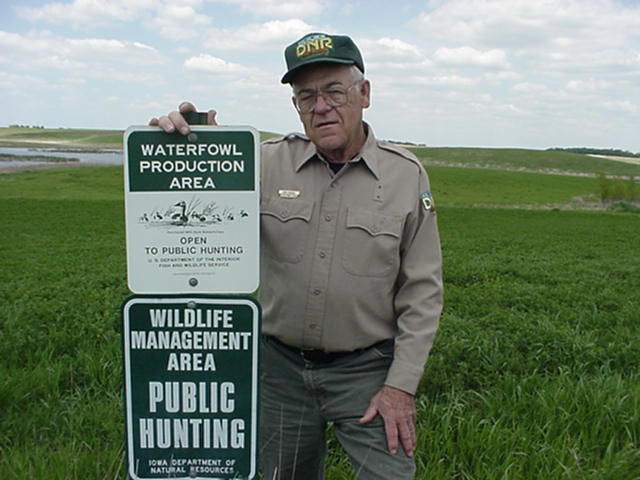
NAME: Ron Howing
JOB TITLE: Wildlife Management Biologist for the Ingham Lake Complex
LOCATION: 2109 Murray Road
Estherville Iowa 51334
712-362-2091
1. What were your favorite things to do outdoors when you were a kid? I grew up in northeast Missouri in a small town surrounded by woods and streams. I spent a lot of time fishing with my friends in ponds and creeks. We even caught crawdads with bacon on a string. Boiled crawdads are almost as good as lobster. When I was about 8 years old, I started going hunting with my grandpa, uncles and most of the time with a neighbor, who trained quail hunting dogs. I was able to shoot a gun, but only under close supervision. My parents gave me a brand-new Stevens 22 automatic rifle for my 12th birthday. During world war II I trapped rabbits in box traps, which I sold to the local feed store. I could hardly wait until school was out to check my traps. I shot my first duck on the Mississippi River, a drake canvasback, when I was a senior in high school. My favorite outdoor activities were hunting quail and fishing for smallmouth bass.
2. What were your favorite classes in school? Biology, physical science and agriculture.
3. Why did you decide to become a Wildlife Biologist? I enjoyed hunting and fishing so much, that I wanted to work with wildlife the rest of my life. My high school vocational agriculture teacher encouraged me and helped me to enroll at the University of Missouri in the Fish & Wildlife curriculum.
4. What kind of schooling do you need in order to work at the Iowa Department of Natural Resources division of Wildlife Management? Biologists need a Bachelor of Science degree in biology or conservation major and many have a Master of Science Degree.
5. How does your job help waterfowl? I spend most of my time developing and managing habitats for waterfowl on Public Wildlife Management Areas and also on private land. Wetlands are restored and uplands are seeded to nesting cover to provide a place for ducks and geese to nest and raise their young. Wetlands are managed by maintaining water levels best suited for waterfowl food and cover. Upland native prairie seedings are managed to provide the best nesting cover. Waterfowl need these habitats for their survival. We would not have ducks or geese if they did not have a place to nest and raise their young.
6. What do you enjoy most about your job? The thing I enjoy most about my job is restoring and managing wetlands. It is really neat to see a beautiful marsh and all of the critters that use wetlands re-appear in a barren field.
7. What are your favorite outdoor activities now as an adult? I do a lot of fishing. My favorite outdoor activity is hunting. I hunt waterfowl, ruffed grouse, wood cock, pheasant, turkey, rabbits & squirrel. I spend a lot of time taking my grandsons hunting and fishing.
8. What advice do you have for children interested in your profession when they grow up? Make sure that you work hard to keep up your grades in school. Ask for advice from you school advisor(s) about courses you need to take to meet the requirements of this profession.

NAME: Bill Ohde
JOB TITLE: Waterfowl Biologist
LOCATION: Lake Odessa Wildlife Unit, SE IOWA
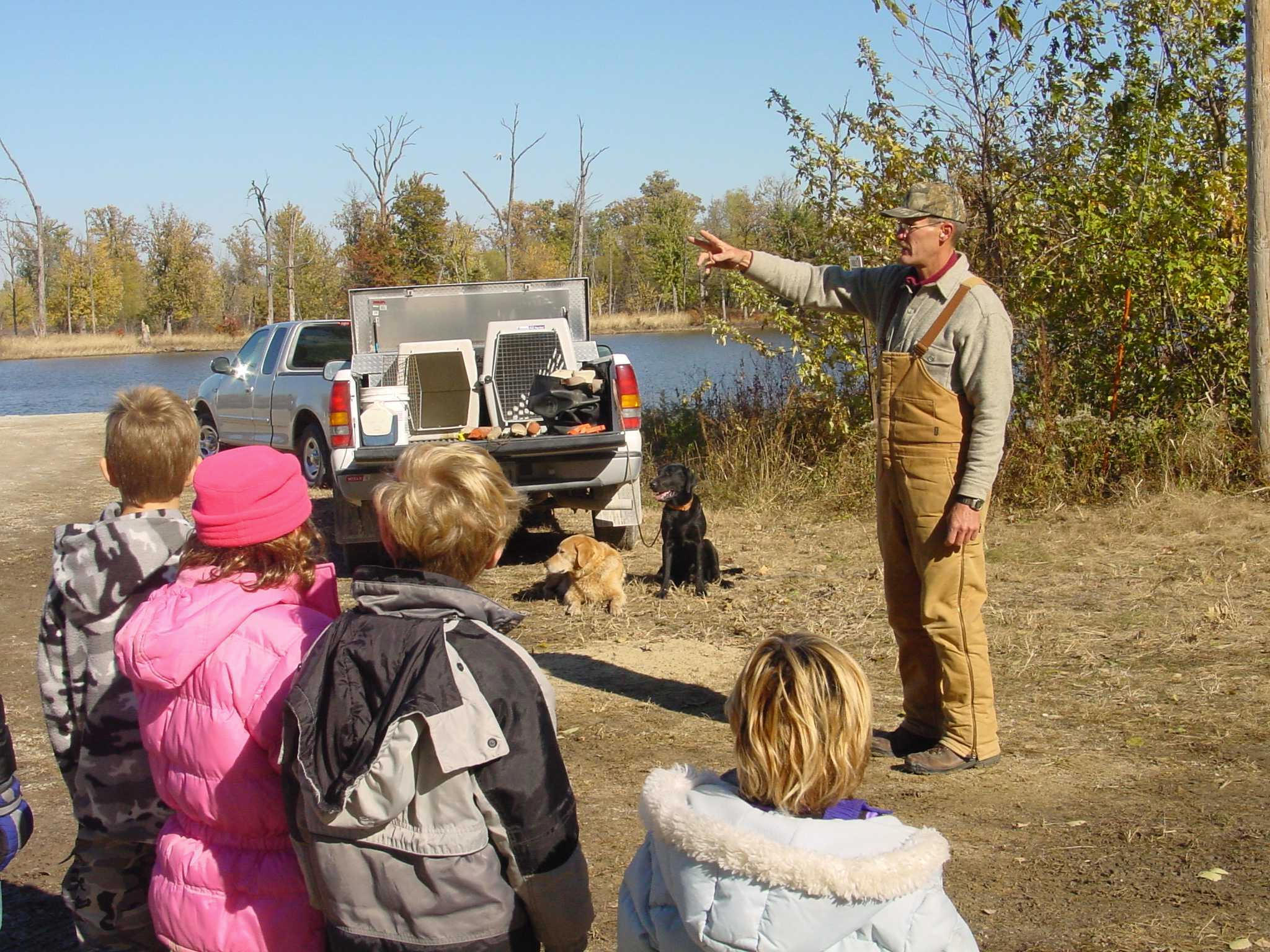
1. What was your favorite things to do outdoors as a kid as well as now?
I grew up on a farm and spent most of my spare time tromping the
neighborhood
creeks and ditches catching any critters I could get my hands on. I was
well known
for having quite a collection of snakes as pets--Mom wouldn't allow them in the
house, so I kept them in an unused silo. Fishing was my favorite outdoor
activity
as a youngster and I went every chance I got. Once I was old enough to
carry a
shotgun, hunting quickly won over as my favorite. I started out hunting
pheasants
because we had lots of them on our farm, but after someone took me duck hunting
for
the first time, that became my favorite and still is today. I also like
turkey
hunting, deer hunting, mushrooming, camping, mountain climbing in Colorado,
birding,
and still enjoy fishing and pheasant hunting. Just wish I had more time to
do it
all!
2. What were your favorite classes in school?
I always liked biology
classes the best but also liked math. In college, I
still liked the biology classes, but really enjoyed the classes dealing with
wildlife and plants.
3. What kind of schooling do you need in
order to work at the Iowa
Department of Natural Resources'
Division of Wildlife Resources?
Biologists all have at least a Bachelor of Science degree in either a
biology,
ecology or conservation major and many have a Master of Science degree.
Important
courses are in biology, ecology, wildlife management, botany, math, statistics,
writing, speech, computer skills and public relations.
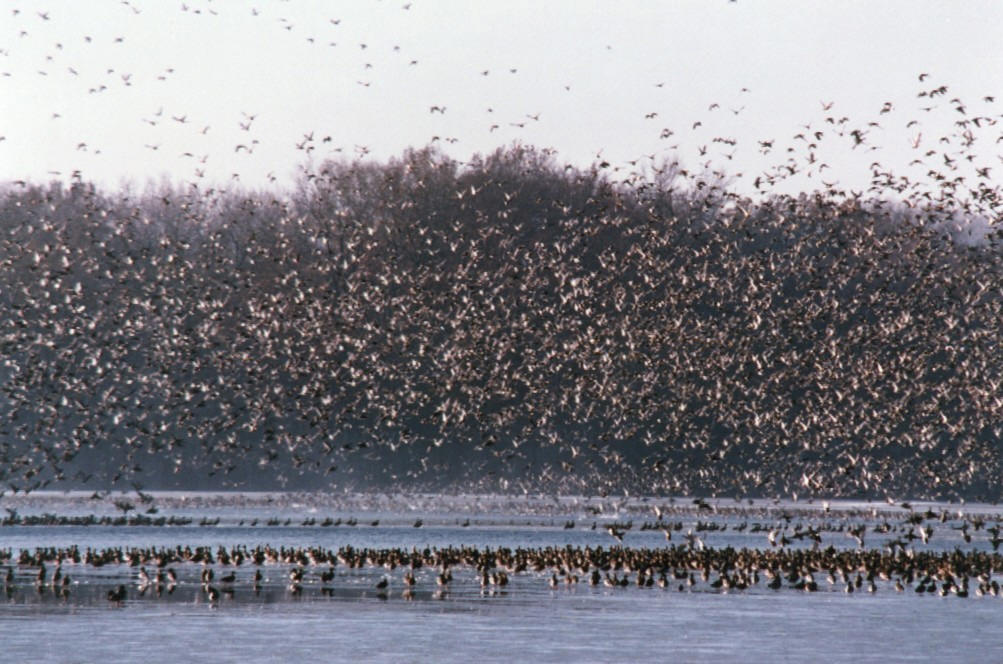
4. How does your
job help waterfowl?
I plan and help carry out the management of several important wetland
areas in
the Odessa Wildlife Unit. We try to make these areas the very best we can
for the
thousands of ducks and geese that stop on their migration here in spring and
fall,
and also for some that stay here to nest. We try to grow the best food and
cover we
can and try to have just the right depth of water for ducks to be able to use
that
food and build up their energy for migration. It takes lots of energy for
those
ducks to migrate all the way from Canada to Arkansas and Louisiana and then back
again in the spring! I also help band ducks and geese so we can keep track
of where
the birds migrate and how many are shot in different areas. That can help
us
setting season dates and lengths to make sure we maintain good populations.
5. What do you enjoy most about your job?
I really enjoy doing waterfowl surveys because it's always a thrill to
see
thousands of ducks and geese. It's also fun to see all the different kinds
of ducks
that migrate through our area on the surveys. I also get to work with a
lot of
different people who have a deep concern for natural resources.
6. What advice do you have for children interested in your profession when they grow up?
The first thing is to work hard in school and take your education
seriously.
Subjects like speech and writing may not seem important to be a Biologist, but
those
skills are used every day. Then find a college that has a strong natural
resources,
fish and wildlife, or ecology department and get your bachelor of science
degree.
While attending college, you should contact potential employers and ask if there
are
summer jobs available. Most college departments can help with this. The
more
experience you get the better. You may find out you don't like a job as
much as you
thought, or you might do something you really enjoy and want to focus in on
that.
You should also get an idea from potential employers whether you should pursue
an
advanced degree to get the job you eventually want. Even though there is
lots of
competition for this profession, I always tell students that if they really want
to
do it, and they work hard and are persistent, they will find the job they want.
The WAI would like to thank Bill for taking the time to answer these questions.
Bill can be reached at 515 Townsend Ave., Wapello, IA 52653 319-523-8319